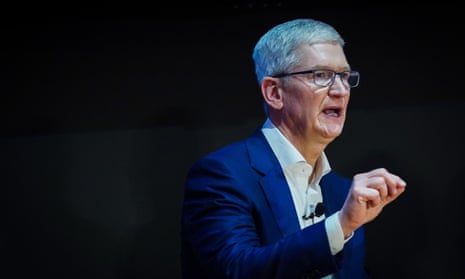Apple has agreed to pay $490m to settle a class-action lawsuit led by the UK’s Norfolk county council.
The class action alleged chief executive Tim Cook misled investors about a steep downturn in iPhone sales in China that culminated in a jarring revision to the company’s revenue forecast.
The Norfolk county council said its pension fund was affected by the company’s alleged actions.
A spokesperson for the Norfolk Pension Fund said: “We are proud of this recovery for investors. We are mindful that we are stewards of pensions relied upon by thousands of families and individuals.
“When and where it’s warranted, we will take decisive action to recover losses when our participants’ investments are harmed by fraud.”
The preliminary settlement filed on Friday in Oakland, California, federal court stems from a shareholder lawsuit focused on the way Apple relayed information about how iPhone models released in September 2018 were performing in China, one of the company’s biggest markets.
Cook signaled that the new iPhones were off to a good start during an investor conference call in early November 2018, according to the complaint.
That reassurance dissolved into a huge letdown on 2 January 2019 when Cook issued a warning that Apple’s revenue for the just-completed quarter would fall $9bn below management’s forecast for the period. What’s more, virtually all of the sales drop was traced to weak demand in China.
It marked the first time Apple had cut its revenue guidance since the iPhone’s release in 2007 and triggered its stock price to plunge 10% in the next day of frenetic trading, wiping out more than $70bn in shareholder wealth.
Apple vehemently denied that Cook had deceived investors about the iPhone’s sales in China between early November and early January. The company maintained that stance in the settlement documents, but said it decided to make the payment after more than four years of legal wrangling to avoid an “overly burdensome, expensive, and distracting” hassle.
The settlement was reached through a mediator after US district judge Yvonne Gonzalez Rogers rejected Apple’s request to dismiss the case, and set a 9 September trial date.
Gonzalez Rogers is now being asked to approve the settlement in a hearing scheduled for 30 April.
Thousands of shareholders who bought Apple stock in late 2018 could be eligible for a piece of the settlement, which will be distributed from a pool that will be less than $490m after lawyers involved in the case are paid. The attorneys plan to seek up to one-fourth, or about $122m, of the settlement.
Norfolk council will receive a portion of the settlement.
The $490m payment represents less than 1% of the $97bn profit that Apple pocketed during its last fiscal year ended in September. Apple shareholders who have held on to their shares have become wealthier too. Apple’s stock price has more than quadrupled from where it stood after Cook’s China warning, creating an additional $2tn in shareholder wealth.
